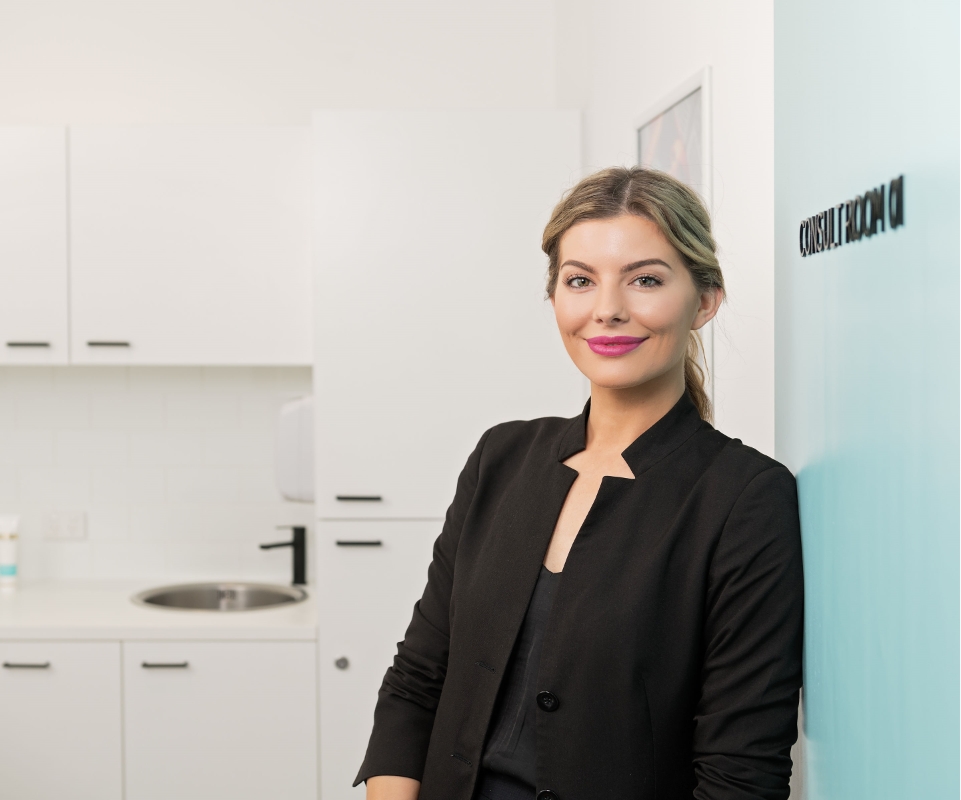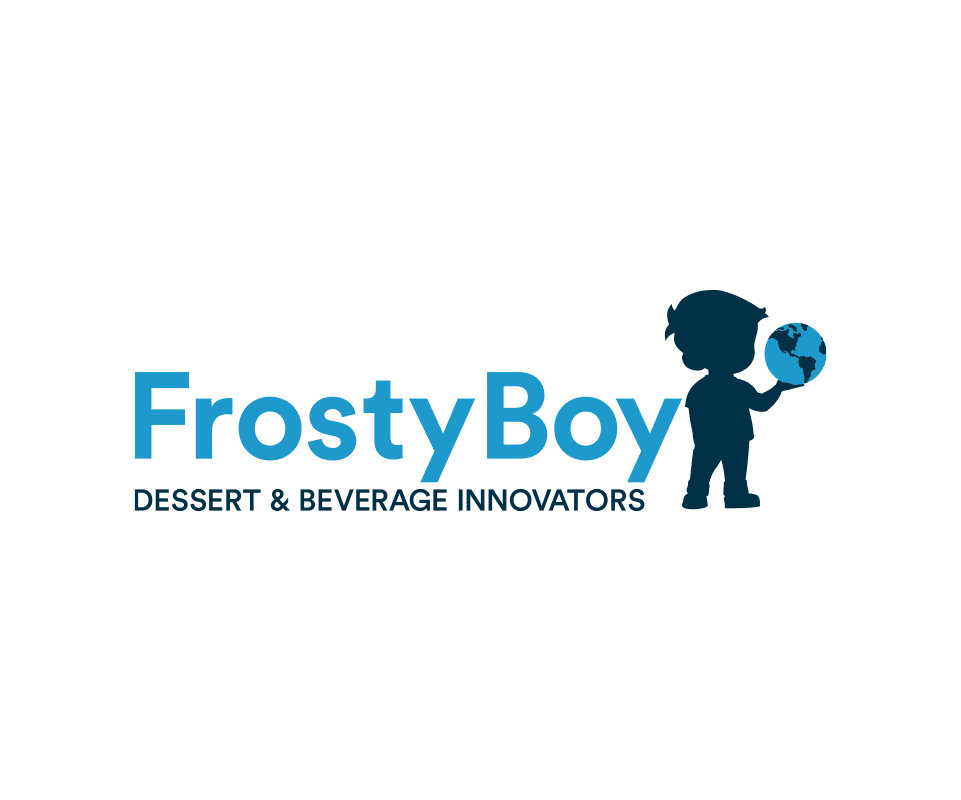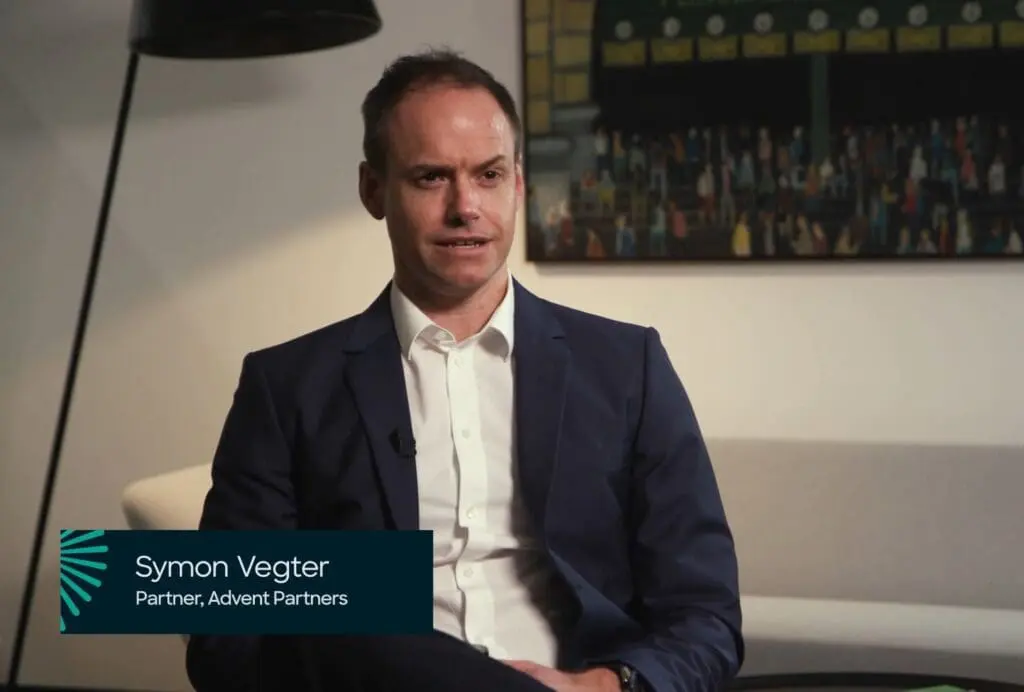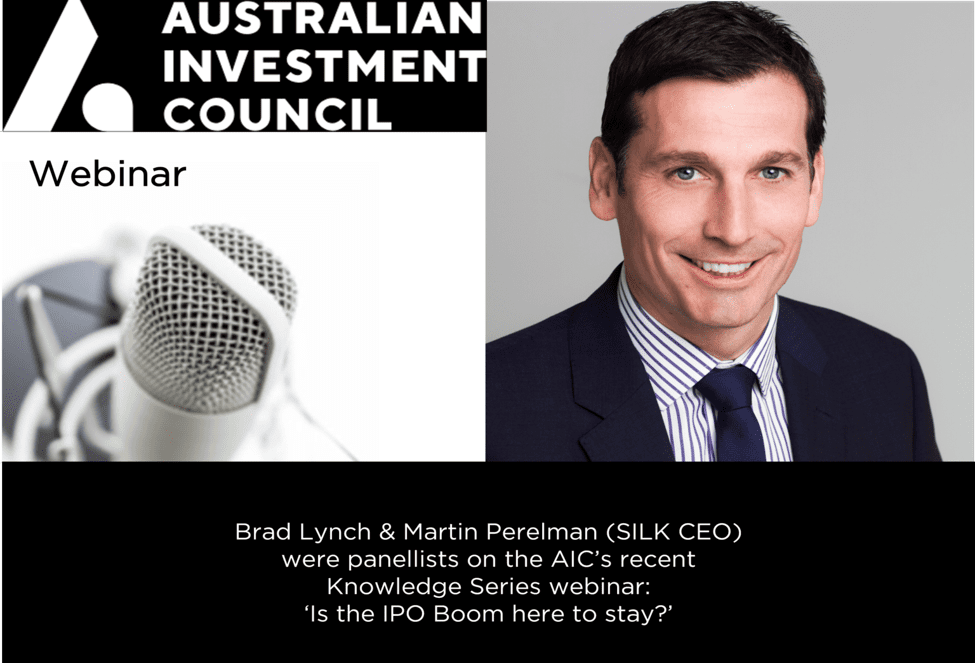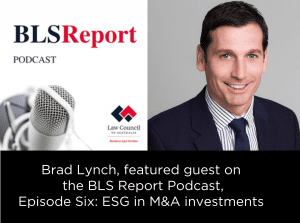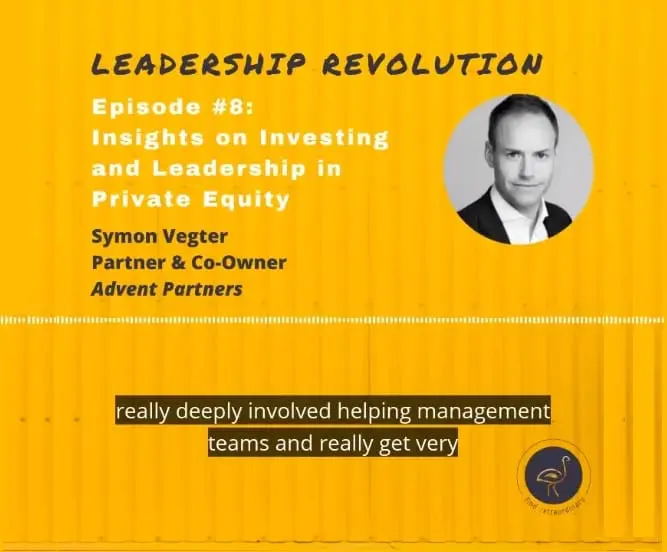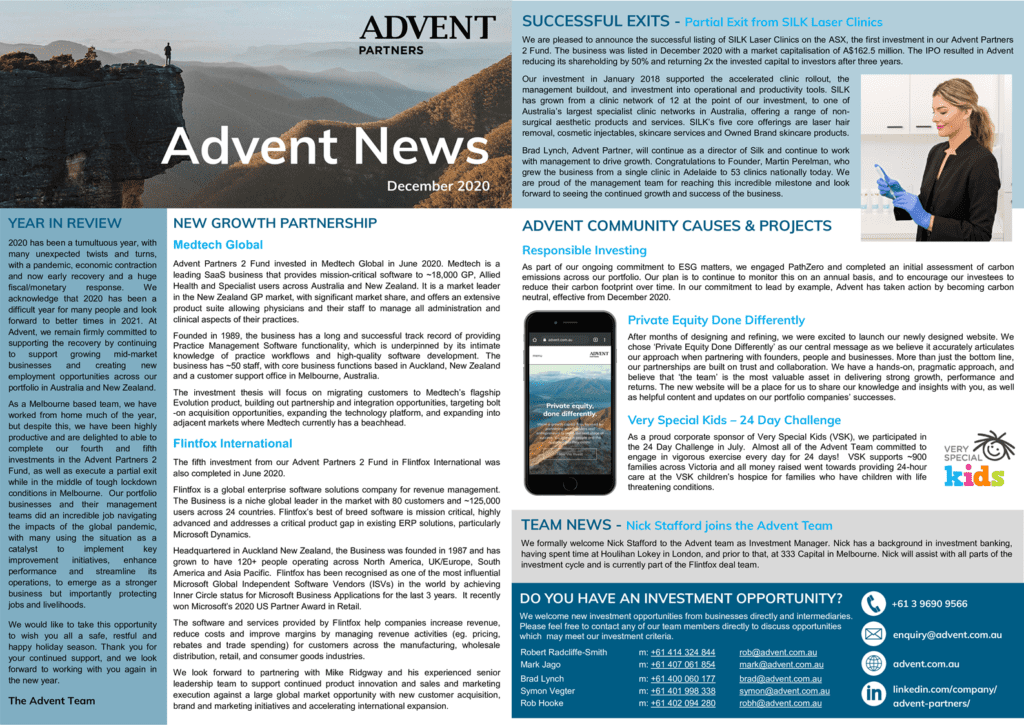The following article is from the AVCJ December 2020 edition, where one of our portfolio companies Silk Laser, is featured. The successes and failures of private equity backed IPO’s in the Australian market are discussed.
Written by Tim Burroughs.
You can read the article on the AVCJ website here
________________________________________________________________________________
Australia IPOs: Window of opportunity
Asian Venture Capital Journal | 04 December 2020
Australian public market investors are famously unforgiving of private equity when IPOs fail to perform. The markets are open for business again, but how long will the golden period last?
What a difference a year makes. Twelve months ago, frustration was in the air as consumer lending business Latitude Financial and online real estate portal PropertyGuru tried and failed to initiate a revival for private equity-backed IPOs in Australia. Both offerings – seeking A$1.4 billion ($1 billion) and A$380 million, respectively – were pulled at the book – building stage due to concerns about secondary market volatility. And so, the more than three-year wait for a sizeable IPO continued.
Now the window appears to have swung open again and no one is willing to pass up what might be a fleeting opportunity. “It opens, everyone rushes in, and inevitably the quality drops and investors get sick of it, or the low-quality stuff gets away and then doesn’t perform,” says Justin Ryan, a managing partner at Quadrant Private Equity. “Then it closes.”
Quadrant secured a first partial exit from its growth fund in October when Adore Beauty, a local beauty e-commerce business, completed a A$270 million IPO, ending Australia’s fallow period. The private equity firm – which took A$137.7 million off the table – was mindful of potential pitfalls, with getting the offering out before the US election an immediate priority.
Plenti, a consumer lending start-up backed by Five V Capital, beat Adore to the bourse by about one month with a smaller offering. Since Adore, a handful of other companies with financial sponsors have made their market debuts. Trent Peterson, formerly of Catalyst Investment Managers and now operating predominantly on a deal-by-deal basis is responsible for two of them: Dusk, a specialist home fragrance retailer, and Universal Store, which sells youth apparel.
Various others have filed for IPOs, including Silk Laser Clinics, a cosmetic treatments business owned by Advent Partners, and Nuix, an analytics software provider that counts Macquarie and Armitage Associates as investors. They are looking to raise A$83.4 million and A$953 million, respectively, with the PE investors to make partial exits. Still more are working on offerings. Robert Radcliffe-Smith, a managing partner at Advent, notes that the traffic in this IPO season is as busy as he’s ever seen.
“The trough was at the end of May, from a transaction perspective. Since then, every month it’s got better and better. If you’d said to me in May that we would have this wave of IPOs in the fourth quarter of 2020, I would have thought you were mad,” says David Willis, a partner and national private equity leader at KPMG Australia.
Seeking alpha
There are several reasons why expectations have been confounded in this way, but the preeminent one is the same as in many other markets around the world: Investors are chasing returns and public equities have rebounded sharply from their initial COVID-19 malaise. In Australia, superannuation funds have plenty of cash at their disposal, while an increasing number of public market investors are reaching into the pre-IPO rounds in search of additional alpha.
Macquarie Capital’s recent A$260 million investment in data registries business Illion, which facilitated a partial exit for Archer Capital, could be seen in this light – Macquarie did the same with Link Group a couple of years before the company’s IPO – but demand is arguably most virulent for high-growth technology start-ups.
Blackbird Ventures has three B2B start-ups in its Fund I portfolio – Canva, Culture Amp, and Safety Culture – that are being actively courted by late-stage investors. “There is a huge amount of interest,” says Rick Baker, co-founder of Blackbird. “It starts with private market growth funds, then crossover funds or hedge funds that do public and private markets investing, and finally some public market investors want to come in as well.”
Those three companies alone are in demand; everything else is still too early for the two-year preIPO cutoff. Baker notes that neither Canva, Culture Amp nor Safety Culture is rushing to list, and assuming they do, Australia’s capital markets might not be the beneficiary. There is still a perception among entrepreneurs that the US markets are deeper, less prone to volatility, and populated by investors with a greater understanding of technology. They want to follow in Atlassian’s footsteps.
Change is contingent on a few start-ups taking a risk on the Australian Securities Exchange (ASX) and demonstrating strong secondary market performance, thereby giving confidence to others. While the ASX has emerged as an attractive listing destination for smaller technology companies, they make little impact on the overall market capitalization and the sector remains underrepresented.
This unmet demand combined with a general interest in the beauty e-commerce narrative and strong performance from listed comparables in the consumer space – Temple & Webster’s stock was up more than 400% for the year through mid-October – underpinned Quadrant’s confidence in Adore. The multiples, enterprise value (EV) to EBTIDA and EV to revenue were 96x and 3.9x, high enough to raise numerous eyebrows.
The valuations say much about the areas where investors are keenest. Dusk and Universal, which are still mainly brick-and-mortar retailers though they are growing their e-commerce channels aggressively, achieved EV/EBIT multiples of 6.7x and 10x. Silk Laser, a strong growth story in a fragmented industry where there is little existing public markets exposure, is on 11.2x EV/EBITDA, while Nuix is on 27.5x (and 9x for EV/revenue).
Looking forward
Given the various bureaucratic necessities – reviews and approvals from the ASX and the Australian Securities & Investments Commission (ASIC) – a company that hasn’t already completed its filings has scant hope of listing before Christmas. Several industry participants do not see this as a problem; there is an expectation that the window will remain open well into the first half of 2021.
Quadrant and Advent are among those considering IPOs for other portfolio companies, though they offer do not give expected timelines. No surprises as to the sectors. Quadrant is looking to list Graysonline, an industrial and commercial auction site, while Advent sees Compass Education, a software-as-a-service (SaaS) provider for schools, as a strong candidate.
Opinion is divided on two recent failed IPOs, neither of which involved private equity. On one hand, they are outliers: Fantastic Furniture traded well through COVID-19 and questions were raised about its normalized earnings; HWL Ebsworth is a law firm and multiple partners were looking to cash out, so there were concerns about stability. On the other, fatigue might already be setting in.
As is generally observed, COVID-19 denied the market an IPO opportunity earlier in the year, so planned offerings are being pushed into the second half and unplanned offerings are looking to take advantage of the moment. A cooling-off period over Christmas might be to everyone’s benefit. KPMG’s Willis warns that sentiment can easily turn: “Anything that’s a bit gray, not a must-have, people end up passing on it.”
Given this innate uncertainty, it pays to jump through the IPO window as soon as it opens. Advent did this with Silk Laser, moving from a standing start to launching an offering within eight weeks. The process was facilitated – and de-risked – by institutional investors agreeing to cover half the IPO, which allowed time to talk to smaller investors and the retail market. Quadrant did the same with Adore, with Ryan noting that virtual roadshows helped in terms of speed to market.
Boutique financial services firm Highbury Partnership advised on the Silk Laser offering, as well as two others this year, one of which was Plenti. Matthew Roberts, a partner at Highbury, stresses the importance of speed to market, noting that investor patience and capacity are not inexhaustible, especially when loss-making technology companies are involved.
“Australian investors get quite fatigued; we always hear that. If you’re at the front of that queue you get a better reception. What we’ve seen this time around is some companies trading well on the secondary market, so investors are making money and that encourages more IPOs,” he says. “Once they come, and investors are recycling money out of IPO into another, if they don’t trade well on the secondary market, those that follow will be impacted.”






